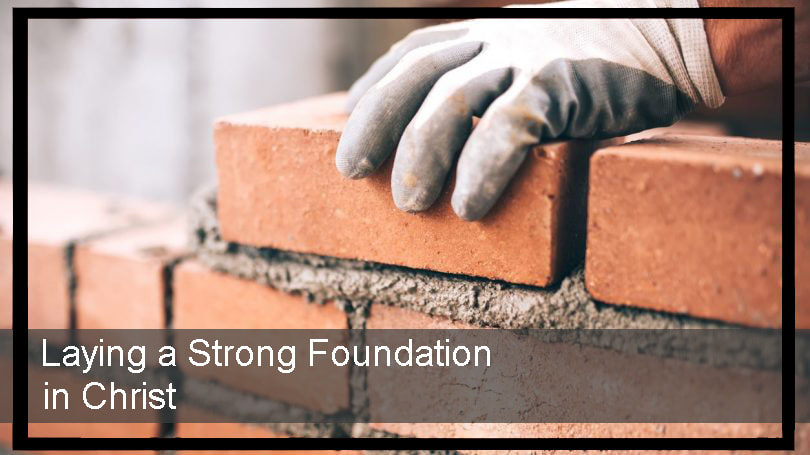|
A N.T. Wright Sermon Summary Paul ventured beyond Jerusalem to convert non-believers to Christ. To the Gentiles, Paul was crazy because Christ was crucified. To the Jews, treating Christ as their Messiah was scandalous. Paul forced both groups to ask themselves who God was, what His purpose was, and what that meant for them.
Those who accepted his message became renewed creations[1], with new eyes and new minds, growing and maturing in their new knowledge of the Creator[2]. No longer enslaved by foolish things, they saw the importance of love[3]. Their new lives centered on Christ. These transformed individuals formed a united and holy community focused on God, not on earthly things[4]. Through this community, people would see Christ as Lord[5]. Paul rooted the above in the Old Testament. Regarding the concept of only one God, as shown in Shema, the Jewish daily prayer: “Hear, O Israel, the Lord is our God; the Lord is one,” Paul refreshed this concept into one God, the Father (we live for Him), and one Lord, Christ (we live through Him)[6]. Just as Christ humbled Himself despite being God, we should also humble ourselves in our relationships with others[7]. In light of this, God the Father shares His glory with Christ; compare this to the Jewish concept of God never sharing His glory[8]. Regarding being God’s people, Jews in Exodus were freed from Egyptian slavery with God living among them, just as we, slaves of sins, become God’s children through Christ, with the Holy Spirit living in us[9]. But Paul placed knowing Christ above all his Jewish privileges[10]. Instead of Jews alone being God’s people, Jews and Gentiles alike are justified through Christ as one people under God. As to our future, it is analogous to how the Israelites left Egypt and inherited the promised land. Through Christ, we become part of the new heaven and earth. Paul teaches us to live according to the Spirit, with our minds set on what the Spirit desires. But we still live in a fallen world. Fortunately, in our weakness, we can rely on the Spirit, who helps us and intercedes for us before the Father[11].What we do in Christ won’t be in vain but instead will be part of God’s new creation. So let us give ourselves fully to the work of the Lord[12]. Summary of a sermon titled “How Paul invented Christian theology,” by N.T. Wright https://www.youtube.com/watch?v=WkcjFHYIugY 1 2 Corinthians 5:17, Romans 8:18-22 2 John 3:7, Romans 8:5-8, Romans 12:2, 1Corinthians 14: 20, Colossians 3:10 3 Galatians 4:8-9, Corinthians 8:1-3 4 Philippians 2:1-2, 3:19; Galatians 2:11-14; Romans 8; Colossians 3:2 5 Ephesian 3:10 6 1 Corinthians 8:6 7 Philippians 2:5-11 8 Philippians 2:10-11, Isaiah 45:23 9 Galatians 4:1-11 10 Philippians 3:2-11 11 Romans 8:5-8, 26, 27; 1 Corinthians 15; Isaiah 11; Revelation 21 12 1 Corinthians 15:58
0 Comments
Examine your faith. Have you cast off duties, particularly difficult ones (Job 27:10), been swallowed up by worldly interest, developed inordinate affection for money or sensual enjoyment (Luke 14:26, 1 John 3:9), or shifted off the responsibility of doing what is right?
Earnestly watch, pray, and strive to be in His grace and not to fall into temptation. In light of your weakness and your powerful enemies, ask God to help us stand firm, particularly in times of trial (Acts 14:22, 11:23, 13:43; Luke 21:34, 36; Ephesians 6:13-14). Seek deeper roots (Ephesians 3:16-17) and bear fruit (2 King 19:30, Joshua 13:5-7). But many of us are like uncultivated ground, full of seeds and roots of thorns (Matthew 13:7, 22) that have never been plowed. The thorns grow spontaneously. Our worldly hearts—inordinate affections towards worldly pleasure (lust of the flesh), profits (lust of the eyes), and honor (pride of life)—choke off the words of God, so fruit cannot grow (Jeremiah 4:3, 1 John 2:15, 1 John 2:16, Mark 4:18-19, Luke 8:14). After the fall, hearts bring forth such thorns (Genesis 3:17-18). Intense worldly concern, affection and pursuits naturally grow. We focus on being superior to others, greed over gain, and carnal pleasures. Not knowing any better happiness, we pursue worldly things above all else. They become the idol we worship. Unfortunately, such naturally and spontaneously growing thorns are useless (Psalm 4:6), bearing no fruit (Isaiah 55:2, Jeremiah 17:11, Job 20:15), and ending in death (Romans 6:21). Furthermore, such pernicious growth wounds the soul, brings no peace nor rest (Ecclesiastes 5:12), and causes intense conflicts and pain among people (James 4:1, Micah 7:4, 2 Samuel 23:6-7). Our uncultivated ground needs to be plowed to create good soil (Matthew 13:7, Jeremiah 4:3). Conviction of our sins and repentance can break up our hardened hearts. See the vile nature of sin against God’s glory. Be convinced of the vanity of the world to break us from them. Deny ourselves and renounce our self-righteousness to kill the thorns. Then the seed of the gospel can flourish and bear abundant fruits. Summary of sermons by Jonathan Edwards: https://www.youtube.com/watch?v=De_4qb15wQQ 荆棘窒息上帝的话 当察验我们的信仰,省察自己是否放弃了职责, 例如那些特别困难的职责(约伯记 27:10),是否被世俗兴趣所吞噬,是否对金钱或肉体上的享受过分依恋(路加福音 14:26,约翰壹书 3:9)或者逃避做正確事情的責任? 真诚地儆醒, 祷告,努力进入上帝的恩典中,不要陷入迷惑。鉴于自己的软弱和强大的敌人,我们当祈求神帮助站立得稳,尤其是在受试炼的时候(使徒行传 14:22, 11:23, 13:43;路加福音 21:34, 36;以弗所书 6:13-14 )。向下扎更深的根基(以弗所书 3:16-17),向上结出佳美的果实(列王纪下19:30,约书亚记 13:5-7)。 但许多人的心就像荒地,满了荆棘的种子和杂根(马太福音 13:7, 22),从来没有被翻耕过。 荆棘会自发地生长蔓延。我们属世的心钟情于世俗的享乐(肉体的情欲)、个人的利益(眼目的情欲)和自己的尊荣(生命的骄傲)。这些都是窒息上帝話语的荆棘,因此果实不能生长(耶利米书 4:3,约翰壹书 2:15-16,马可福音 4:18-19,路加福音 8:14)。 人心在堕落之后长出这样的荆棘(创世记3:17-18)。对世俗的忧虑,热恋和追求自然而然地增长。人热衷于超越他人、贪婪利益以及肉体的快乐。当不知道更好的幸福时,便追求世界和世界上的情欲高于一切,使之成为崇拜的偶像。 不幸的是这种自然生长的荆棘毫无用处(诗篇 4:6),不会结出任何果实(以赛亚书 55:2,耶利米书 17:11,约伯记 20:15),最后只有以死亡告终(罗马书 6:21)。此外,这种有害的生长伤害人的灵魂,使他没有平安,不得休息(传道书 5:12),并且在人与人之间造成激烈的冲突和痛苦(雅各书 4:1,弥迦书 7:4,撒母耳记 23:6-7)。 未开垦的土地需要靠耕种变成良好的土壤(马太福音 13:7,耶利米书 4:3)。类似的,只有通过认罪悔改才能粉碎我们刚硬的心。让我们为上帝所憎恨的罪深感内疚,看清它们敌对上帝荣耀的邪恶本质,识破世界的虚荣,摆脱它的辖制. 舍弃自己,弃绝自以为义,摧毁心里的荆棘,这样福音的种子才能发旺生长,结出丰硕的果实。 Many of us are careful about what we put into our bodies, and yet are remarkably careless in what we put into our minds. What we put into our mind determines the person we become.
We have access to more content than anyone in history, and we devour it. Our mobile phones have become our companions. We feel uncomfortable waiting in line without reading from them. Unfortunately, many things we consume, particularly from the social media, are misleading and downright dangerous. They can weigh us down with inappropriate worry, anger, and fear. Be mindful of what goes into your mind. The Bible is where God reveals Himself to us, educating us about Christ’s actions, teachings, death, and resurrection. It is where God teaches us our identity, how we should live, and where we will go. It is a book full of wisdom. So, read the Bible regularly. Start from the four Gospels. Read it repeatedly to hold on to what you have learned (2 Timothy 3:14). Meditate on the Bible you have read. To a certain extend, meditation is like worrying. In worrying, thoughts repeat in our minds and drag us down. But in meditating the Bible, these repeating thoughts elevate us. Read the Bible to seek help and guidance from God for our everyday life. Make a note on questions to find answers later. Apply what you have learned from the Bible (James 1:22). Reading the Bible is not just to increase our knowledge, but also to change our lives and to equip us for different types of good work (2 Timothy 3:14-17). As to good work, there is no need to have a huge plan. Just do the next right thing. Be kind. Drive slower. Mention to someone you believe in God. Volunteer for the right activities. Give somebody an unexpected honest compliment. Relax. Forgive. Laugh. Go outside, look at the world, and say, “Thank you, God.” If we do the wrong thing, remember God says, “My grace is sufficient for you.” 2 Corinthians 12:9. Repent, receive mercy, and do the next right thing. In conclusion, control what goes into your mind. Read the Bible regularly. Commit to do what it says. Do the next right thing. God can and will help us. Let Him transform us by renewing our minds through the Bible. Summarized from a sermon by John Ortberg: https://www.youtube.com/watch?v=MGbdXphnXEg https://s3.amazonaws.com/media.menlo.church/The-Way_Study_Sep2019_jortberg.pdf?mtime=20191007104917 学习 很多人对自己的饮食谨慎,而对放入脑子的东西粗心大意。但是放入我们脑子的东西决定我们成为什么样的人。 我们拥有的信息比历史上任何人都多。并且我们贪婪地吸收它们,如像沉浸于看模因的世界中,浪费多少时间。我们的移动电话成为我们的伴侣。在排队等候时, 如果我们不从电话中看东西便会感到不舒服。不幸的是,我们今天看到的很多东西,尤其是从社交媒体上看到的,许多是错误, 荒谬, 和危险的。它们可能引起不适当的担忧,愤怒和恐惧。 要控制进入我们脑海的事物。 圣经是天父向我们彰显自己的地方,告诉我们有关基督,祂的活动,教导,死亡和复活。天父在那里教导我们应该如何生活, 将去何方, 以及我们的身份。这是一本充满智慧的书。 因此,经常阅读圣经。从四本福音书开始。一遍又一遍地读,紧紧抓住我们所学到的 (提摩太后书3:14)。 沉思我们已读的内容。在某种程度上, 默想有点像担心。担心使我们由反复思索中引致沮丧。然而,默想圣经让我们从反复的思考中得以提升。 阅读圣经寻求神对我们日常生活的帮助和指导。记下问题,以便以后找到答案。 运用我们所学到的(雅各书1:22)。 我们阅读圣经的目标不仅是增加知识,而也是为了改变生活, 改变人生,并装备我们做良好的事工(提摩太后书3:14-17)。 关于良好事工,无需设计宏伟的计划。只要做下一件正确的事情。如善待他人,开车慢一点。告诉别人你相信上帝。又或者参与有益该做的活动。给某人意想不到的诚实赞美。放松点。多原谅。常常笑。到外面走走,看看世界,说:“谢谢上帝。” 如果我们做错了事,记得上帝说:“我的恩典夠你用的(哥林多后书12:9)。” 悔改,接受怜悯,做下一件正确的事情。 总而言之,控制进入我们脑海的事物。经常阅读圣经。致力于做它所说的。 做对的事情。上帝可以并且会帮助我们的。让祂通过圣经更新我们的思想, 改变我们。 Christ told the story of building a house to symbolize building our life, character, or soul. (Matthew 7:24-27, Luke 14:25-33). Irrespective of wealth, intelligence, or faith in God, the house built will face unavoidable storms. The outcome, stand or fall, depends on the choice we make for its foundation.
Christ described two types of foundations. A strong and solid one depends on listening to and following Him. A weak foundation is one listening to His teachings without following Him. Note that the dichotomy here is not good versus bad, but wisdom versus folly. Make decisions wisely, soberly, and not emotionally (Luke 14:25-33). Having said that, similar to getting married or having kids, we must be comfortable that we can never be absolutely certain with our choices. Count the cost of following Him. It can require laying down our ego, control, reputation, or certain habits, preferences, relationships, attitudes, or behaviors. Count the cost of not following Him. It can result in a life enslaved by ego, money, image, reputation, or power; living a life of fear and greed; or dying in despair, after living a meaningless life. Count the benefits of following Him: forgiven of our mistakes through grace from the cross; having God’s guidance and help; living a life with hope and meaning, beyond worry and fear, and not enslaved by money, reputation, sex, safety, or image; or having confidence of life after death. Typically, we don’t choose to be evil or intentionally plan the wrong path. We don’t get married planning to divorce. We don’t go to the office intending to meet someone with whom to have an affair. We don’t have children planning to wreck them. We don’t live our life planning to be greedy, selfish, or racist. But these things can happen when we make choices entirely based on how we feel. Do we follow ourselves or God? Learn from Christ and follow Him. We may not be as good as the original disciples, at least initially. Just try to understand and follow Him. Choose wisely. Our life depends on what we choose as our foundation. Summary of a sermon by John Ortberg: https://s3.amazonaws.com/media.menlo.church/Choose-Your-Foundation_Apr2018_jortberg.pdf?mtime=20180504112555 智慧地选择生命的根基 基督讲过一个建造房屋的故事,用来象征建造一个人的生活、品格或灵魂 (马太福音7:24-27,路加福音14:25-33)。无论个人的财富、智慧或对上帝的信仰如何,那被建造的房屋都会面临不可避免的风暴。其结果或是屹立不动或是倒塌在地, 都取决于人对其根基作出的选择。 基督描绘了两种不同类型的根基。有坚固根基的是一个先聆听然后跟随祂的人;有薄弱的根基的是听了祂的教导却不跟随的人。请注意这里比较的不是人的好坏,而是他的聪明或愚拙。 应该冷静地作出智慧而清醒的决定,不能感情用事 (路加福音14:25-33)。 话虽如此,我们要知道就像结婚或生孩子一样,人对自己的选择不可能有完全的把握。 数算跟随祂的代价:可能意味着放下自我、控制、声誉、习惯、偏爱、关系、态度或行为。 数算不跟随祂的代价:可能意味着一生被自我、金钱、形象、声誉或权力所奴役,过着恐惧和贪婪的生活,枉度一生后绝望地死去。 数算跟随祂的益处:籍着十字架的恩典过犯得以赦免,得到上帝的引导和帮助,过着不让忧虑控制而是充满盼望和意义的生活,摆脱金钱、声誉、性欲、安全或形象的奴役,对死后的生命充满信心。 人通常不会选择邪恶或故意策划错误的道路:结婚时不会打算离婚;上班时不会刻意寻找外遇;生孩子时不会谋策如何毁了他们;不会计划过一个贪婪自私的生活或选择做一个种族歧视的人。但如果完全依靠自己的情绪来做选择,这样的情形可能发生。 我们是跟随自己还是跟随上帝呢? 当向基督学习并跟随祂。 我们可能不像当初的那些门徒一样优秀,至少起初不能做到那样。 只要尽力认识基督并跟随祂,做出智慧的决择。人的生命取决于选择什么作为生命的根基。 The Golden Gate Bridge stands when the world shakes because of its foundation. Its two towers, deeply embedded into the rock underneath the sea, firmly hold the rails that link every part of the bridge.
Many build their foundation on weaker grounds, such as their reputation. They want to appear smart, rich, strong, honorable, and even spiritual. Paul did the opposite. He described himself as a fool for Christ, weak, poor, brutally treated, laborer, scum of the earth, and garbage of the world (1 Corinthians 4:10-13). Others’ opinion could not sway him because only God was his judge (1 Corinthians 4:4). A solid foundation cannot be based on transient things such as money, fame, power, health, and look. Solid foundation depends on our thoughts, desires, intentions, habits, and character. These internal things form our inner world, governing our life. What we take to eternity is not our resume or our houses, but the person we have become. Let Christ be our foundation, we be God’s building, under God’s construction (1 Corinthians 3:9), transformed into Christ’s image and becoming glorious (2 Corinthians 3:18). Our eternal glory far outweighs our momentary troubles (2 Corinthians 4:17). Gradually, we will be filled with goodness that lasts, with love, joy, and peace; instead of always in a hurry for our ego and envy, filled with chronic anxiety. We will be truthful and authentic, instead of hiding, faking, and making us look better than we really are. We will not be arrogant because we know we are nothing without Christ. We will not be judgmental toward others because we know we are not even qualified to judge ourselves. Even a clear conscience does not mean innocence because we do not know many of our hidden faults (1Corinthians 4:4, Psalm 19:12). Let God be the judge. One day He will bring everything to light (1 Corinthians 4:5). To conclude, listen to and follow Christ. Let Christ be our foundation, and let God build us up. Then even in severe storms with rising streams, we will firmly stand (1 Corinthians 3:9, Matthew 7:25). Summarized from the following sermons from John Ortberg: https://menlo.church/series/cross-examine#/modal/message/4756/mlo https://menlo.church/series/cross-examine#/modal/message/4791/mlo 设计生命 当地震来到大地摇动时,金门大桥仍然屹立不倒,因其根基坚固。两座高塔深深地嵌入海底的岩石中,牢牢地支撑着连接桥梁的栏轨。 许多人将根基建立在薄弱的根基上面,例如自己的名声。他们想使自己显得聪明、富有、坚强、尊贵甚至虔诚。 保罗则刚刚相反。他形容自己為基督的緣故算是愚拙、軟弱、 贫穷,被残酷虐待, 勞苦做工,被视为败类和萬物中的渣滓 (哥林多前书4:10-13)。别人的意见不能动摇他,因为他相信只有上帝是审判者(哥林多前书4:4)。 坚实的基础不能建立在金钱、名望、权力、康健和外表等短暂的事物上。 坚实的基础取决于人的思想、欲望、意图、习惯和性格。这些内在的因素构成他的内心世界,支配着他的一生。 人不能带着简历或房屋进到永生,那时能带的只有自己本身。 让基督作为我们的根基,我们成为上帝的房屋,由上帝建造 (哥林多前书3:9)。我们将转变成基督的形像,变得大有荣光 (哥林多后书3:18)。将来永恒的荣耀将远远超过目前至暂至轻的苦楚 (哥林多后书4:17)。 我们渐渐地将不会总为自我和嫉妒繁忙而长期焦虑,而是被永恒的美善、仁爱、喜乐和平安所充满。我们将不再隐藏, 伪装自己,而是做个真诚可信的人。 我们将不再自大,因为知道没有基督,我们就什么都没有。 不再批判别人,因为知道我们甚至没有资格判断自己。即使问心无愧也不等于自己无罪, 因为并不知道很多隐而未现的错误 (哥林多前书4:4;诗篇19:12)。 让上帝做审判的法官,有一天祂会把一切都显露出来 (哥林多前书4:5)。 总而言之,聆听并跟随基督,以基督为根基,让上帝建立我们。如此,即使在暴风雨中,尽管溪流不断上升,我们仍将坚定地站立得稳(哥林多前书3:9; 马太福音7:25)。 We all hear people say that to have a fulfilled life, we must take full control of it. But we soon learn that many problems in life are beyond us. Then some of us humble ourselves and, rather than blaming our genes, our upbringing, or the society, we accept that in many situations, we are the problem (Matthew 5:3).
We should not be the master, ignoring God’s sovereignty. We feel sad, acknowledge our mistakes, and accept the consequences (Matthew 5:4-5). Both moralists and Christians are sorry for their mistakes. But moralists think their good behaviors would compensate, while Christians see our actions cannot take us out of God’s wrath. Yet, many of us still yearn to be approved and accepted by the Almighty (Matt 5:6). May be because we want to boost our ego or feel good about ourselves. In any event, God hates sin and could not just accept us (Romans 3:10-12). God is angry because He loves us. If someone we love is consumed by narcotics, destroying his future, we would be angry with him too. We want to free him of this terrible bondage, even if he has to go through severe pain, though we desire for mercy in the suffering. Our path to be right with God is through Christ suffering and taking our punishment. Christ sacrificed Himself for us so we could become God’s children, justified in His eyes. We willingly follow Him and listen to Him at least because of His love for us and His wisdom. God accepts us because we rely on Christ. If we do well, we will not feel puffed up or brag. If we fail, we will not be cast down. What others think of us is not important because God’s acceptance is not based on our works. In conclusion, humbly and sadly, we accept our weakness and mistakes. Then we rely on Christ’s sacrifice to become God‘s children, listening to and following God. This is the way to live a fulfilled life. Summarized from a Tim Keller sermon: https://gospelinlife.com/downloads/coming-to-christ-6354/ 丰盛生命之路? 经常听到有人说想拥有一种完全由自己掌管的丰盛生命,但不久就发现生活中有许多问题无法解决。 于是有些人变得谦卑, 接受在很多情况下自己便是问题的根源,而不是归咎于基因、成长或社会的影响(马太福音5:3)。 我们不应该成为自己的主人而无视上帝的主权,应该为罪感到悲哀, 承认自己的过错并接受其后果 (马太福音5:4-5)。 道德主义者和基督徒都为自己的过犯感到抱歉。但道德主义者认为良好的行为可以弥补错失,而基督徒则认为个人的行为无法使人摆脱上帝的忿怒。 然而,许多人仍然渴望得到全能上帝的认可和接纳 (马太福音5:6). 这可能因为想自我提升或让感觉良好。 无论如何,因为上帝恨恶罪,所以不能就直接接纳犯了罪的我们(罗马书3:10-12)。 上帝因爱而愤怒。如果有一个我们所爱的人被毒品消耗,破坏了他的前途,我们也会对他感到愤怒。即使要他忍受极度的痛苦,为了使他摆脱这种可怕的束缚,我们也会接受, 但希望他在痛苦中能得到怜悯。 我们与神和好的道路是通过基督受难,代替我们接受惩罚,使我们与上帝和好。基督为我们牺牲自己,使我们能够成为上帝的儿女,在祂眼中可以称义。 我们愿意跟随上帝,听祂的话, 至少因为祂对我们的大慈爱和祂无法测度的智慧。 上帝接纳我们是因为我们依靠基督。 如果做得好,我们不会感到骄矜; 如果失败了,也不会灰心。 其他人的看法并不重要,因为上帝的接纳并非基于我们所做的事。 总而言之,当以谦卑和悲恸的心来接受自己的软弱和错误,然后全心依靠基督的牺牲成为上帝的儿女,聆听祂并跟随祂。这就是通往丰盛生命的道路。 In the Old Testament, a father’s blessing to his child was very important. Isaac, son of Abraham, had two sons, Esau and Jacob. In his old age, Isaac decided to give his blessing to Esau because Esau was his favorite. At that time, Isaac was blind. Disguised as Esau, Jacob fooled Isaac and got his blessing. When Esau found out, he was furious.
It is unclear why Isaac could not just take back the blessing. When therapists tell us even off-hand comments, simple words and symbolic actions, could have an impact on us. How much more is a blessing from your father who is about to die? As we know, words can have significant influence, especially on our children, so we must choose them carefully. Based on what we know of our children, we should use words to empower, encourage, and affirm. We need blessings from those we value. The main figure we should value is God. How do we, the sinful ones, receive God’s blessing? Through Christ’s sacrifice. Whenever Christ prayed, He always addressed God as the Father, except once. When He was on the cross, Christ cried out in a loud voice, “My God, my God, why have you forsaken me?” (Matthew 27:46) At that point, Christ had lost His sonship. He took on the curse we deserved so we could get God’s blessings (Galatians 3:13-14). We can receive God’s blessing exactly as we are, unlike Jacob, who had to hide his real self to get his father’s blessing. Because of Christ, God loves us as much as He loves Christ! (John 17:23). We become just like Christ in the eyes of God (Hebrews 12:23). Abraham received God’s blessing. Then he became the channel of blessings to all on earth because Christ was Abraham’s descendant (Genesis 12:2-3). Similarly, after receiving God’s blessing, we also can bring blessings to others. In conclusion, through Christ, we get God’s blessings. God loves us as much as He loves Christ. From that, we become a source of blessings to others. Summarized from a Tim Keller sermon: https://gospelinlife.com/downloads/the-problem-of-blessing-5247/ 我们为什么蒙福? 在旧约中父亲对子女的祝福极为重要。 亚伯拉罕的儿子以撒生以扫和雅各。他年老时决定将祝福赐给最爱的以扫。当时以撒已经眼睛昏花,不能看见。 雅各伪装成以扫欺骗以撒,得到父亲的祝福。以扫发现自己的祝福被骗走后非常愤怒。 不清楚为什么以撒不能撤回这祝福。心理治疗师告诉我们即使是随便的评语、简单的话语或象征性的举动都可以影响我们,更何况是父亲去世前的祝福呢? 话语可以产生重大的影响, 尤其是父母对儿女讲的话。仔细选择言词,根据对儿女的了解用话语来加添他们的力量,鼓励和肯定他们。 人都需要得到自己看重之人的祝福,而我们最应该看重的乃是上帝。 但我们这有罪的人怎么能得到上帝的赐福呢?答案是藉着基督的牺牲。 每当基督祈祷时,除了一次以外,祂总是称呼上帝为父。只有一次,就是在十字架上的时候,祂大声喊着说:“我的上帝,我的上帝,为什么离弃我(马太福音27:46)?”那时基督失去了儿子的身份,承担我们应得的诅咒,使我们可以得到神的赐福 (加拉太书3:13-14)。 今天我们照着自己的本相就能得到上帝的赐福,不必像雅各必须隐藏自己 才能获得父亲的祝福。 因为基督的缘故, 天父爱我们就像爱基督一样(约翰福音17:23)!我们在天父眼中都可以像基督 (希伯来书12:23)。 因为基督是亚伯拉罕的后裔,亚伯拉罕接受上帝的赐福后成为世上所有人蒙福的渠道 (创12:2-3)。同样地,我们得到神的赐福后也可以将福份带给别人。 总而言之,我们籍着基督得到上帝的赐福,上帝爱我们就像爱基督一样。从此,我们便可以成为其他人蒙福的渠道。 Many think God will accept them if they follow the Ten Commandments. But can we follow them? Can we love the Lord with all our heart, or love our neighbor as ourselves? (Matthew 22:36-40)
When we fail, we try to hide our weaknesses. Just like going out on a date, we struggle to cover up our blemishes and accentuate our best qualities. We have been doing that since Adam. Initially, the naked Adam and Eve felt no shame. But they listened to the serpent and decided to be their own masters. Suddenly, they knew they were naked, and they were ashamed. They hid, feeling insufficient. Instead of trying to please God, we try to please someone else, or we focus on something else. We are insecure and spend lots of effort to cover up. Unfortunately, we have missed the point. The only pair of eyes that matters is God’s. Yet, before them, we are absolutely inadequate. We cannot be right with God through our effort. The way to God is through Christ. Through Christ’s crucifixion, we become good in God’s eyes. Note that we are not abandoning our efforts to do good. But we cast away relying on our effect to be good before God. Our works are a response to God’s grace, not a means to win it. If we know God should be our leader, though we fail to follow God, there is no need for us to hide from Him. Instead, we should draw near to Christ, who came for sinners. God’s eyes are the only ones that count. Money, beauty, fame, power, or our efforts, cannot make us acceptable to Him. Instead, we should rely on God’s mercy and trust in the work of Christ. That is the way to be good with God. Summarized from a Tim Keller’s sermon: https://gospelinlife.com/downloads/the-breastplate-of-righteousness-5683/ 我们能靠遵循十诫成为好人吗? 许多人认为如果遵循《圣经》上帝便会接纳自己。 但是我们能够遵循十诫吗?我们能够全心全意地爱上帝或爱邻如己吗(马太福音22:36-40)? 当我们做不到时,就会试图掩饰自己的弱点。就像约会时一样,我们会努力地掩饰瑕疵并强调自己最大的优点。 自亚当以来,我们一直都在这样做。最初,赤裸的亚当和夏娃没有感到羞耻,但是后来听从蛇的声音,便决定做自己的主人。突然间,他们知道自己的赤裸并且为此感到羞愧。于是,他们觉得自己不足就躲了起来。 我们试图取悦他人或专注其它事情,而不尝试去取悦上帝。我们没有安全感,花费了很多努力来掩盖。 不幸的是我们错过了重点。唯一重要的是上帝如何看待我们。但是在上帝眼前我们绝对是有亏缺的。 我们不能通过自己的努力而被上帝接纳。 通往上帝的路是基督。籍着基督被钉在十字架上,我们在上帝的眼中被看为好。 请留意这并不是放弃努力行善,而是放弃倚靠它来取得上帝的接纳。我们的行为是对上帝恩典的回应,而不是赢得它的手段。 如果我们知道应该让上帝做主人却做不到,没有必要躲避祂。相反地,当就近基督,因祂是为罪人而来。 上帝如何看我们是唯一重要的。金钱、美丽、名望、权力或努力都无法赚得上帝的接纳。当倚靠上帝的怜悯, 相信基督为我们所成就的一切,这就是与上帝和好之道。 Many believe that low self-esteem leads to bad behaviors, but they also despise those with grand views of themselves. So which is preferred: Low or high self-esteem?
Let’s look at the nature of ego. Our ego focuses on ourselves. Triumph can send us to cloud 9, while insult and contempt can send us into despair. Our ego makes us compare ourselves to our neighbors, causing us frustration when we think he’s better. Our ego constantly drives us, pushing us to do more like an ever-present slave driver. But similar to a black hole, ego cannot be satisfied. Paul had incredible ability, but how was his ego? He did not care how others thought of him, or how they judged him. These are attributes of a person with high self-esteem. But Paul also did not necessarily think well of himself. He did not consider himself innocent even if he had a clear conscience (1 Corinthians 4:3-4). This is distinct from many with high self-esteem, who care a lot about how they think of themselves. Paul separated his performance from his identity. He did not think highly of himself, despite his significant accomplishments. He considered himself the worst sinner (1 Timothy 1:15), yet he didn’t beat himself up. His identity was entirely rooted in Christ. Because of what Christ had done, God found Paul good and valuable (Romans 8:1). To Paul, only Christ’s opinion of him counted (1 Corinthians 4:4). He also attributed his strength to Christ (Philippians 4:13). Learn from Paul. How others see us, and how we see ourselves, are not that important. We should not define ourselves, our identity, or our value by our performance. We are blessed children of God because of Christ. Rejoice in Him. Rely on Christ to live. Summarized from a Tim Keller sermon: https://gospelinlife.com/downloads/blessed-self-forgetfulness-5261/ 如何处理自我? 许多人认为自卑会导致有害的行为, 但也鄙视自大的人。自卑或自大哪一个更好呢? 让我们一起来看看自我的性质。 一个人的自我专注于他自己:胜利可以使它觉得飘飘然,而侮辱和蔑视则可以让它悲凉。 自我促使我们与邻舍比较。如果别人比我们好,这就会带来痛苦。 自我就像一个一直在身旁的奴隶主,不断地驱使我们要努力做得比以前更好。但它又像太空黑洞一样永远不能被满足。 保罗具有惊人的能力,他的自我又如何呢? 保罗不在乎别人如何看自己,也不在乎人对他的评价。这是具有高度自尊之人的属性。 但保罗也不在乎自己如何看自己。即使问心无愧,他也不认为自己是无罪的(哥林多前书4:3-4)。这与许多自尊高的人不同,那些人都很在乎对自己的看法。 保罗把自己的表现与身份分开。尽管有重大的成就,他对自己却没有很高的评价。 相反地,他认为自己是罪人中的罪魁,但也不会自责不已(提摩太前书1:15)。 保罗的身份完全是基于基督。因基督的作为,上帝视他为良善和有价值的人(罗马书8:1)。对保罗来说,只有基督对他的意见才重要(哥林多前书4:4)。保罗认为他的力量来自基督(腓立比书4:13)。 让我们向保罗学习。人如何看我们以及我们如何看自己并非那么重要。不要通过表现来定义自己的身份和价值。我们因为基督成为神蒙福的儿女。让我们在基督里欢欣,并且倚靠基督而活。 Let's look at Haman, the person the Persian king most honored (Esther 3:1-6, 6:1-10).
The exiled Jews seemed to do well in Persia (Esther 6:13). When the king of Persia required everyone to kneel and honor him, and when Mordecai, a Jew, didn’t comply, Haman planned to use this as an opportunity to kill all the Jews in Persia. Previously, Mordecai had warned the king of an assassination attempt. Having been reminded of Mordecai’s loyalty, the king decided to reward him and asked Haman how to do so. Believing himself to be the recipient, Haman suggested something extravagant, and the king commanded Haman to personally deliver the reward to Mordecai. That gave Haman a lot of grief and began his downfall, ultimately leading to his death. An arrogant person is only concerned with himself. Everything is about him. This person always considers himself to be right. Since he thinks he makes no mistakes, he can’t learn from his own failure or others’ criticism, which leads to more serious blunders. This person tends to hold grudges. He assumes he would never commit the wrongs that others do, and so he is less inclined to forgive. The humble will be exalted, while the arrogant who always tries to lift himself higher will be humiliated (Matthew 23:12). So how can we rid ourselves of arrogance, particularly when it is so difficult for a person to recognize his own shortcomings? First, we must admit that we tend to be self-centered and arrogant. Remember that the conceited rarely think themselves as such. Second, know that we are sinful and corrupted. There is nothing in us that we should be proud of. On the other hand, we should not feel inferior and needy because through Christ, we have God’s recognition and glory, the glory Christ received from God the Father (John 17:22)! To conclude, know that we are filled with defects, yet because of Christ, we have God’s glory and praises. Though we are confident and proud of our status, there is nothing we should be arrogant about. So, we should focus less on ourselves and more on others. Summary of a sermon by Tim Keller https://gospelinlife.com/downloads/the-man-the-king-delights-to-honor-5529/ 您认识一个傲慢的人吗? 让我们一起来看看以斯帖记3:1-6和6:1-10中波斯国王最尊荣的人, 哈曼。 当时被流放在波斯的犹太人似乎做得不错 (以斯帖记6:13)。波斯国王要求所有人跪下向他敬拜时,有一位名叫末底改的犹太人不听从,哈曼想藉此机会杀死波斯国中所有的犹太人。 此前末底改曾警告国王有暗杀他的阴谋。一天夜晚有人提醒国王末底改的忠心,国王就决定奖励末底改,并询问哈曼该如何行。哈曼自以为国王说要奖励的人是他,便提出一些奢侈的建议。国王接纳了哈曼的建议,还命令他亲自将奖赏送给末底改。这使哈曼感到难受万分, 也成为他垮台的开始,最终导致他的灭亡。 傲慢的人具有某些特征。这样的人只关心自己,一切都要与他有关,他需要成为一切事物的中心。 这样的人总自以为是,认为自己没有错误,无法从自己的失败或他人的批评中吸取教训,进而导致更严重的失误。 这样的人往往会怀恨在心,认为不会犯与其他人一样的错误,使他更难原谅犯下这些错误的人。 “凡自高的必降为卑,自卑的必升为高 (马太福音23:12)。” 如何摆脱骄傲自满呢,特别是当一个人很难识别自己有这个缺点时? 首先,承认我们有自我中心和自大的倾向。请记住,自负的人很少有这样的自我认知。 其次,知道人都是有罪和败坏的,我们里面没任何值得骄傲之处。另一方面,不应感到自卑和贫穷,因为籍着基督我们得到上帝的认可和荣耀,就是基督从父神那里得到的荣耀(约翰福音17:22)! 总而言之,当知道我们每个人都充满缺陷,但因着基督得到上帝的荣耀和赞美。尽管我们可以为自己的地位充满信心和自豪,但不应自高自大。应对自己少些关注,而更多地关心他人。 |
Categories
All
|
Proudly powered by Weebly









